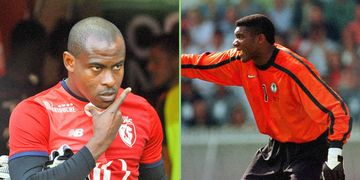Nigerian football players aren't much in the La Liga, however, out of the few Nigerians who played in the League came some wonderful players.
Here are the Top 5 Nigerian Football Players who played in the Spanish La Liga.
5) Victor Nosa Ikpeba
Victor Ikpeba was discovered by Belgian club RFC Liégeois during the 1989 FIFA U-17 World Championship, and moved to play in Belgium together with team mate Sunday Oliseh. At the age of 20, after scoring 17 goals in 1992–93. Ikpeba was bought by French side AS Monaco then coached by Arsène Wenger, where he gradually became a success, albeit with a tough start. He showed outstanding form subsequent to the 1996 Olympics, scoring 13 league goals to help AS Monaco win the league title. His performances earned him the African Footballer of the Year award in 1997. Two successful seasons followed.
Ikpeba teamed up with Sunday Oliseh at Borussia Dortmund in 1999, for a transfer fee of £4.8m. Ikpeba scored only two goals in his first season in the Bundesliga and barely played in his second, after falling out with the coach Matthias Sammer. Looking for a move abroad, Ikpeba turned down Southampton, to join Real Betis on a season-long loan. Things went further downhill for the player in Spain as he was criticised for being overweight by the coach, after making just one appearance for the club. He didn’t feature for Betis again up until the last two games of the season.
Ikpeba played thirty-one international matches and scored seven goals for Nigeria. He played at the FIFA World Cups in 1994and 1998. Ikpeba helped win the 1994 African Nations Cup and the Olympic football gold medal in 1996.
4) Emmanuel Amuneke
Emmanuel Amuneke played as a left winger for club and country. In the 1996 December transfer window, Amuneke was bought by La Liga giants FC Barcelona for US$3.6 million, making his official debut on the 22nd in a 1–0 home win against Celta de Vigo, and scoring on 16 March of the following year in a 1–0 success at CD Logroñés. His spell in Catalonia would be effectively ended after the 1997 off-season, after he suffered a serious knee injury, following which he appeared very rarely for the club (only three league games in three full seasons combined).
Amuneke played 27 times for Nigeria, scoring nine goals. He helped the Super Eagles win the Africa Cup of Nations in Tunisia, eventually being voted African Footballer of the Year. Additionally, Amuneke played all the games at the 1996 Summer Olympics in Atlanta, as the national team won the gold medal.
3) Mutiu Adepoju
Mutiu Adepoju never made the grade at Real Madrid, despite being one of the top performers in the Castilla and the B Team, but still went on to enjoy a fine career in La Liga. He thrived in Spain, with Racing Santander, Real Sociedad and Salamanca, playing 175 times in La Liga and scoring 22 goals in the process.
He helped Racing to promotion to the top flight and played an influential role in keeping them up, often saving the day with a well-placed header or an effective late run into the box.
He went on to collect 54 international full caps, with five goals. He made his debut against Togo in August 1990, but his breakthrough at international level came during the 1992 Africa Cup of Nations, and he helped his nation win the next continental edition.
Adepoju was part of the squads for the FIFA World Cups in 1994, 1998 – scoring in a 3–2 win against Spain – and 2002 (although he did not play in the latter tournament).
2) Finidi George
Arguably Nigeria’s best ever winger, Findi George was, for a time at least, one of the finest right wingers in the world. He burst onto the scene with Ajax, winning three Dutch titles and the Champions League before moving to Spain in 1996.
Originally, Real Madrid was his intended destination, but when that move fell through, he signed for Real Betis. He enjoyed a terrific scoring rate with the club and was present as the Andalusian side made it to the Copa del Rey final, before being beaten by Barcelona after extra time.
Finidi was one of Betis’s star players as they managed to claim fourth place in La Liga and remained loyal to the club following their relegation in 2000.
1) Ikechukwu Uche
Nigerian hitman Ike Uche has spent 13 years in Spanish football. Having moved to Racing Ferrol as a teenager, he has never left the nation’s sporting pyramid and featured for six different clubs.
A purple period at Recreativo that brought 50 goals in 133 games resulted in the Segunda title and a subsequent eighth-place finish in La Liga, but, conversely, a move to Zaragoza didn’t work out. Injuries plagued his stay at the club, which included separate spells of over six months each on the sidelines.


